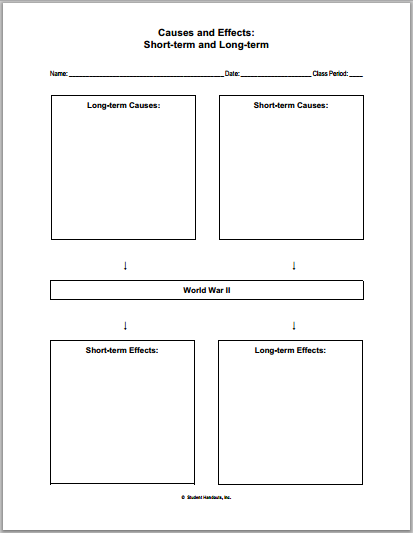Students list short- and long-term causes and effects of World War II.
Click here to print. Answers will vary.
Short-Term Causes of World War II:
- Treaty of Versailles (1919): The harsh terms imposed on Germany after World War I fostered resentment and economic hardship, setting the stage for extremist ideologies.
- Aggressive Expansion by Axis Powers: Germany's invasion of Poland, Italy's invasions in Africa, and Japan's expansion in Asia prompted military responses from Allied nations.
- Failure of Appeasement: European powers' policy of appeasement towards Hitler's early territorial expansions emboldened Nazi aggression.
Long-Term Causes of World War II:
- Economic Instability: The Great Depression created global economic turmoil, contributing to political instability and the rise of totalitarian regimes.
- Nationalism and Militarism: The rise of aggressive nationalism and militarism in Germany, Italy, and Japan fueled ambitions for territorial expansion and dominance.
- Weakness of the League of Nations: The League's inability to enforce peace and prevent aggression undermined international cooperation and deterrence efforts.
Short-Term Effects of World War II:
- Human Casualties and Destruction: The war caused unprecedented loss of life and widespread destruction, particularly in Europe and Asia.
- Defeat of Axis Powers: The unconditional surrender of Germany, Italy, and Japan led to significant geopolitical changes and the end of fascist regimes.
- United Nations Formation: Established in 1945 to promote international cooperation and prevent future conflicts.
Long-Term Effects of World War II:
- Cold War Onset: The ideological divide between the United States and the Soviet Union led to a prolonged period of geopolitical tension and competition.
- Decolonization: The war weakened European powers, accelerating the process of decolonization in Asia, Africa, and the Middle East.
- Economic and Political Restructuring: Post-war economic recovery plans, such as the Marshall Plan, and the establishment of new democratic governments in former Axis countries shaped the modern global order.
|



















































